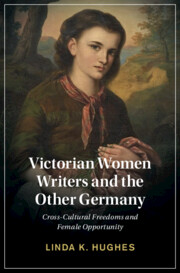Book contents
- Victorian Women Writers and the Other Germany
- Cambridge Studies in Nineteenth-Century Literature and Culture
- Victorian Women Writers and the Other Germany
- Copyright page
- Dedication
- Epigraph
- Contents
- Figures
- Acknowledgements
- Preface/Vorwort
- Introduction
- Chapter 1 Entrée to the ‘Other’ Germany
- Chapter 2 Germany through a Female Lens
- Chapter 3 Networked Families in Germany
- Chapter 4 An Unbeliever in Germany
- Chapter 5 The Anglo–German Fiction of George Eliot and Jessie Fothergill
- Chapter 6 New Woman Travellers and Translators
- Chapter 7 An Anglo–German Expatriate–Citizen
- Chapter 8 Queer Borders
- Nachwort/Afterword
- Notes
- Bibliography
- Index
- Cambridge Studies in Nineteenth-Century Literature and Culture
Chapter 4 - An Unbeliever in Germany
Marian Evans (George Eliot), 1854–1855
Published online by Cambridge University Press: 02 June 2022
- Victorian Women Writers and the Other Germany
- Cambridge Studies in Nineteenth-Century Literature and Culture
- Victorian Women Writers and the Other Germany
- Copyright page
- Dedication
- Epigraph
- Contents
- Figures
- Acknowledgements
- Preface/Vorwort
- Introduction
- Chapter 1 Entrée to the ‘Other’ Germany
- Chapter 2 Germany through a Female Lens
- Chapter 3 Networked Families in Germany
- Chapter 4 An Unbeliever in Germany
- Chapter 5 The Anglo–German Fiction of George Eliot and Jessie Fothergill
- Chapter 6 New Woman Travellers and Translators
- Chapter 7 An Anglo–German Expatriate–Citizen
- Chapter 8 Queer Borders
- Nachwort/Afterword
- Notes
- Bibliography
- Index
- Cambridge Studies in Nineteenth-Century Literature and Culture
Summary
An iconoclast in religion and marriage in 1854–5, Marian Evans, later George Eliot, was a more conventional female traveller than her precursors in Chapters 2 and 3 due to her limited listening and speaking skills and her reliance on her partner George Henry Lewes for travel arrangements and social contacts. Her potential for cultural exchange was also limited by her desire to avoid encountering scandalous gossip that had followed her from England. Evans’s discernibly greater interest in German intellectual men than women additionally meant that she neither had nor took the opportunity to form a female friendship network in the mid-1850s. Thus, unlike Jameson or Howitt, she never met Goethe or Goethe’s friends (aside from Fanny Lewald). Eliot’s limited ethnoexocentrism also manifested itself in her public and private writing about German Jews, most notably Heinrich Heine. The chapter analyses in detail one of Evans/Eliot’s best-known essays, ‘German Wit’, in which Evans erases Heine’s Jewish identity to posit him as a German writer qualified to succeed Johann von Goethe in greatness. Though she would later have known about Heine’s Jewish origins, they remained erased when she revised her 1855 anonymous essay into George Eliot’s posthumously published essay of 1884.
- Type
- Chapter
- Information
- Victorian Women Writers and the Other GermanyCross-Cultural Freedoms and Female Opportunity, pp. 87 - 106Publisher: Cambridge University PressPrint publication year: 2022

